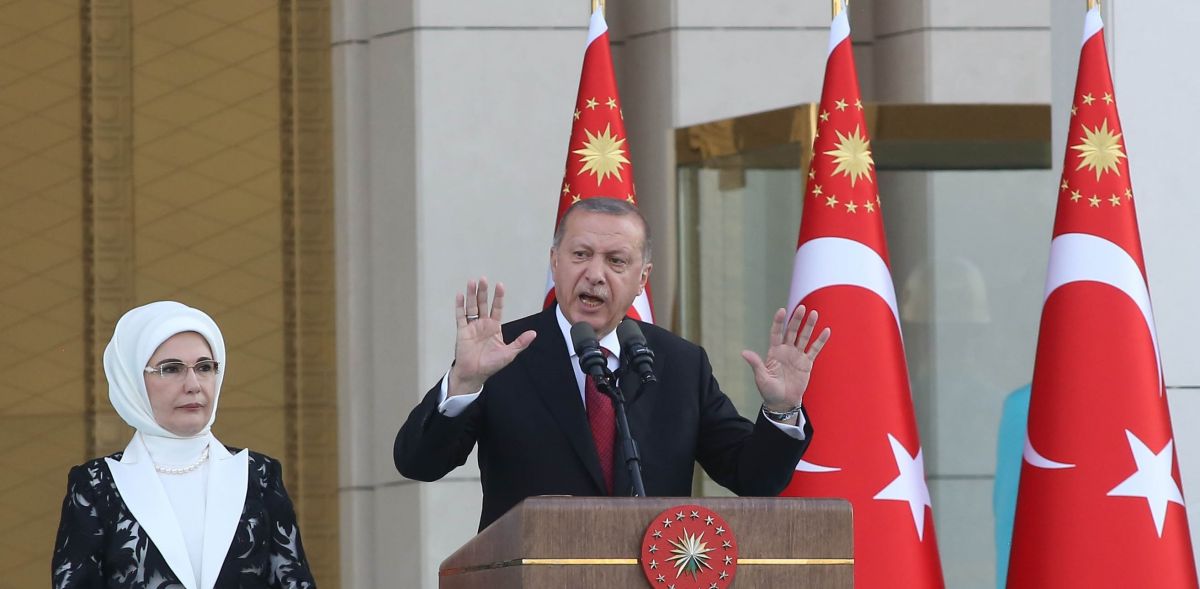
It’s time to call out Turkey’s human and workers’ rights abuses
London hosts today’s NATO summit at a critical time for the 29-state military alliance.
There will be many issues under the spotlight, but one of the most pressing is the worsening human rights record of one of NATO’s key members: Turkey.
A brutal domestic crackdown on workers after the failed military coup in 2016 has been followed by unilateral and unjustified military action against the progressive Kurdish communities of north-eastern Syria.
We don’t think Turkey is living up to its obligations on worker and human rights. And as a country with close trading and security ties to Turkey, we think the UK government needs to do more to call out these abuses.
That’s why we’re calling for the UK government to use today’s summit to pressure Turkey to withdraw from Syria and engage in a peace process with the Kurds.
And it’s why the TUC has made Turkey one of our priority countries in the fight for human and trade union rights.
Abuses at home
Turkey declared a state of emergency in the immediate aftermath of the failed military coup in 2016.
This gave the Turkish government an excuse to abuse security policies to dismiss public officials, including trade union officials, public sector workers, judges and teachers and others.
Those victimised also risked losing their homes and pensions.
The numbers are just staggering: nearly 160,000 people arrested during an 18-month state of emergency; 152,000 civil servants dismissed, many totally arbitrarily; teachers, judges and lawyers dismissed or prosecuted; journalists arrested, media outlets shut down and websites blocked – clearly the successive states of emergency declared in Turkey have been used to severely and arbitrarily curtail the human rights of a very large number of people.
Several strikes and protests were banned, and they are still restricted. As UK trade unionists know, anti-trade union restrictions have a chilling effect on union power, including protection of health and safety.
In 2018, when workers protested following a shocking 42 deaths on the construction site for the new Istanbul airport, they were arrested.
The state of emergency ended in July 2018, but the damage done to civil institutions has been severe.
And the public service trade union confederation KESK believes that the state of emergency has been lifted “on paper only”.
Turkey jails more journalists than anywhere else in the world. Journalists are routinely arrested, harassed and intimidated, and teachers and academics can be arbitrarily dismissed from their posts.
These factors have contributed to a narrowing of public discourse.
Turkey is listed as one of the ten worst countries in the world for violating workers’ rights in the ITUC Global Rights Index, with a ranking of 5 “No guarantee for rights”.
Foreign workers are unable to join trade unions in Turkey, leaving migrant workers vulnerable.
Abuses abroad
Turkey’s incursion into north-eastern Syria has caused a breakdown in security.
It led to the execution of prominent female Kurdish politician Hevrin Khalaf (and her driver), widely documented human rights abuses, the escape of detained ISIS fighters, and greater internal displacement.
Progressives around the world saw the democratic cantons in north-eastern Syria as a beacon of hope, promoting democracy and women’s liberation.
Through the ITUC, the TUC has sent its solidarity to the Kurdish people of north-eastern Syria.
President Erdoğan has shown flagrant disregard for international law and civilian life, and has ruthlessly persecuted trade unionists, journalists and political opponents at home.
A duty to act
The UK’s has longstanding diplomatic, trading and military links with Turkey.
So when Turkey doesn’t live up to its worker and human rights obligations, we expect our government to act.
And we don’t think workers’ and human rights should be sacrificed simply because the UK and Turkey are part of a strategic alliance.
The UK government sent mixed messages on the invasion of Syria.
On 15 October, foreign secretary Dominic Raab condemned Turkey’s military action and halted new arms sales to Turkey.
But at a NATO meeting in London, Defence Secretary Ben Wallace was more qualified, implying that Turkey’s actions amounted to self-defence.
The government also stopped short of supporting a common EU position on halting all arms sales to the Turkish regime.
The UK’s trade arrangements with Turkey pay lip service to International Labour Organisation conventions on human and trade union rights, but these conventions are not enforced.
So we want the UK government to use its diplomatic influence to press Turkey to withdraw from Syria and negotiate a peace with the Kurds.
The release of leader Abdullah Ocalan is an essential part of this process, which is why the TUC and many UK trade unions support the Freedom for Ocalan campaign.
Our government should also include remedial measures for human rights violations when negotiating future trade deals.
What can trade unions do?
Trade union solidarity is important to Turkish trade unionists. UK unions have supported their Turkish counterparts by observing trials and visiting imprisoned trade unionists.
The ITUC has called for the cessation of weapons sales to Turkey and for engagement in a peace process.
Trade unions can also:
- Send a letter to the Turkish embassy in London (embassy.london@mfa.gov.tr) demanding that the Turkish government respect workers’ and human rights
- Send a letter to the Foreign and Commonwealth Office (fcocorrespondence@fco.gov.uk) (and your MP, once parliament is back in session) demanding the UK government apply pressure to their NATO ally to respect workers’ and human rights.
Stay Updated
Want to hear about our latest news and blogs?
Sign up now to get it straight to your inbox
